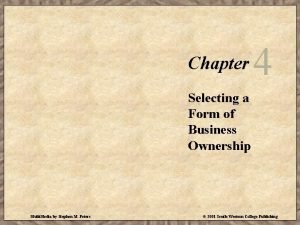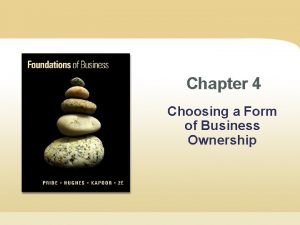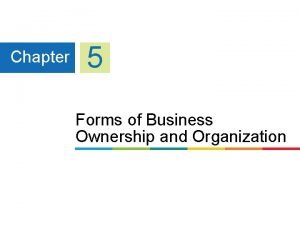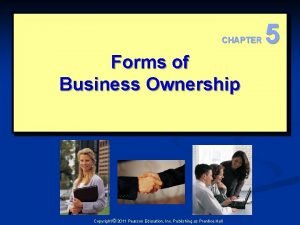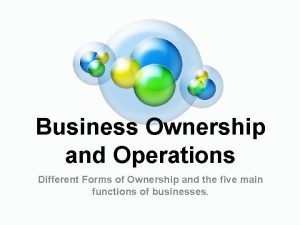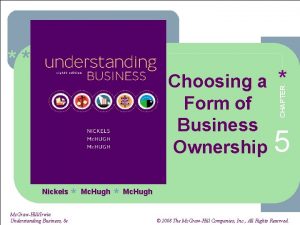Forms of ownership Choosing a form of ownership






















- Slides: 22

Forms of ownership

Choosing a form of ownership � There's no best form of ownership. � The best form of ownership depends on the entrepreneurs situation. � � Evaluation of the characteristics weighing pros and cons. Then deciding which form suits you as an owner.

Factors to consider � Control of business � Managerial ability � Cost of formation � Liability exposure � Tax consideration

The forms of ownership Sole proprietorship Partnership Companies: public company private company Corporate corporation

Characteristics of sole proprietorship � One individual. � Simple to start and end. � Owner is liable for all the debts of the business. � Capital provided by sole owner. � Business managed by owner.

Sole Proprietorship Advantages � � No restrictions limits to capital Quick decision making few legal requirements All profits belong to owner Disadvantages � No legal personality � Feeling of isolation � Unlimited liabilities � Lack of continuity

Characteristics of Partnership � � Ownership 2 or more people Legal requirements � Each partner must make a contribution to the Partnership. � Life of the Partnership is not separate from the lives of the partners � Partners are jointly and severally liable for debts on the business.

Types of partnerships • General partnership: A partnership in which all partners have unlimited personal liability and take full responsibility for the management of the business. • Limited partnership: A partnership in which the partners’ liability is limited to their investment. • Joint venture: A partnership in which two companies join to complete a specific project. The partnership ends after a specified period of time. • Strategic alliance: A partnership in which two businesses work together for mutual benefit

Partnership Advantages Combination of new skills and ideas into a business. shared responsibilities for decision making share profits and are therefore motivated to work hard. Few legal requirements Disadvantages Not a separate legal entity Liable for the actions of the other partners Discussion between partners can slow down decision making. Problems can arise if one or more partners are lazy, inefficient or even dishonest

Characteristics of companies � A company is a legal person which has capacity and powers to act on its own (i. e. the law sees a company in the same light as a natural person) � A company is incorporated by completing and filing a Memorandum of Incorporation (MOI) and a Notice of

Continued The MOI represents the founding statement of a company under the Act. A company becomes a juristic person from the date and time that its incorporation is registered, as stated in its Registration Certificate. A person who is an incorporator, shareholder or director is not liable for the obligations of the company except to the extent that the Act or the company’s MOI expressly provide otherwise. Registration of a company is effected by signature of the MOI by the requisite number of persons and by filing it together with the prescribed Notice of Incorporation at CIPC, together with payment of the prescribed fee.

Types of companies � Profit Companies - A company incorporated for the purpose of financial gain for its shareholders. Private company Public company � Non-Profit Companies to be reflected as NPC

Characteristics of private company � 1 or more persons may incorporate a private company. � one director (1 or more directors) or any other � prohibited by MOI from offering its shares to the public and the transferability of its � shares is restricted. � The name of a private company must end with the expression “Proprietary Limited” or its abbreviation “(Pty) Ltd. ”. � unlimited number of shareholders and its life span is perpetual or it has continual life span. � has a separate legal personality. Shareholders have limited liability

Characteristics of public company � No limit on number of shareholders � Unlimited number of shareholders. � Must have at least three directors. 3 or more for a public (Ltd) company � Shares of the public company are freely transferable. � Financial statement of a public company requires to be audited � A separate legal personality � Compelled to attend a annual general meeting (AGM).

Private company Advantages Disadvantages � Limited liabilities � � Directors not compelled to attend (AGM) The company is subjected to double taxation � Audited financial statements are optional. Transferability of its shares is restricted. � Information only available to shareholders. Compelled to prepare annual financial statements � Many legal requirements � � � Shareholders of a right of preemption

Public company Advantages � � � Disadvantages � Operated by only one shareholder and 3 directors Complicated and expensive to establish � Easier to attract capital investment Shareholder may be allowed little or no input � Expensive procedures to comply with reporting regulations. Separate legal entity

The difference between a private and public company private � � one directors No mechanism for electronic participation at public � a minimum of three directors � Mechanism for electronic participation required

Types of corporations • C-corporation: The most common form of corporation. It protects the entrepreneur from being personally sued for the actions and debts of the corporation. • Subchapter S corporation: A corporation that is taxed like a sole proprietorship or partnership. • Nonprofit corporation: Legal entities that make money for reasons other than the owner’s profit. • Limited Liability Company (LLC): A new form of business ownership that provides limited liability and tax advantages.

Corporate Corporations Advantages All of advantages of a regular C corporation Single taxation Avoids tax on appreciation of asset sold Pay SSS for employees Different lines of businesses as subsidiaries, simpler tax filing Disadvantages Cost and time in incorporating Double taxation Potential for diminished incentives Legal requirements and red tape Potential loss of control

Alternative approaches to starting a business • Buy an existing business. • Enter a family business. • Own a franchise business.

Advantages of buying an existing business • Existing businesses already have customers, suppliers, and procedures. • Seller of the business may be willing to train the new owner. • There are existing financial records. • Financial arrangements may be easier.

Disadvantages of buying an existing business • Business may be for sale because it is not making a profit. • Problems may be inherited with the purchase of an existing business. • Many entrepreneurs may not have the capital needed to purchase an existing business.
 Business ownership
Business ownership A corporation organized to provide a social educational
A corporation organized to provide a social educational Basic forms of ownership
Basic forms of ownership Sole proprietorship examples
Sole proprietorship examples Chapter 5 business organization
Chapter 5 business organization Basic forms of ownership
Basic forms of ownership Business ownership types
Business ownership types Form of ownership example
Form of ownership example Why are related forms more agreeable than unrelated forms?
Why are related forms more agreeable than unrelated forms? Contracted form of i am
Contracted form of i am Why are related forms more agreeable than unrelated forms
Why are related forms more agreeable than unrelated forms Why are related forms more agreeable than unrelated forms?
Why are related forms more agreeable than unrelated forms? Strong forms
Strong forms Present progressive affirmative negative interrogative
Present progressive affirmative negative interrogative Choosing foods wisely quiz
Choosing foods wisely quiz Choosing abstinence quiz
Choosing abstinence quiz Typical room height metric unit
Typical room height metric unit Lesson 25 choosing healthful foods
Lesson 25 choosing healthful foods Labour saving devices in the kitchen and their uses
Labour saving devices in the kitchen and their uses Result approach in measuring performance
Result approach in measuring performance Appropriate graph
Appropriate graph Url brand elements
Url brand elements Approaches to measuring performance
Approaches to measuring performance
